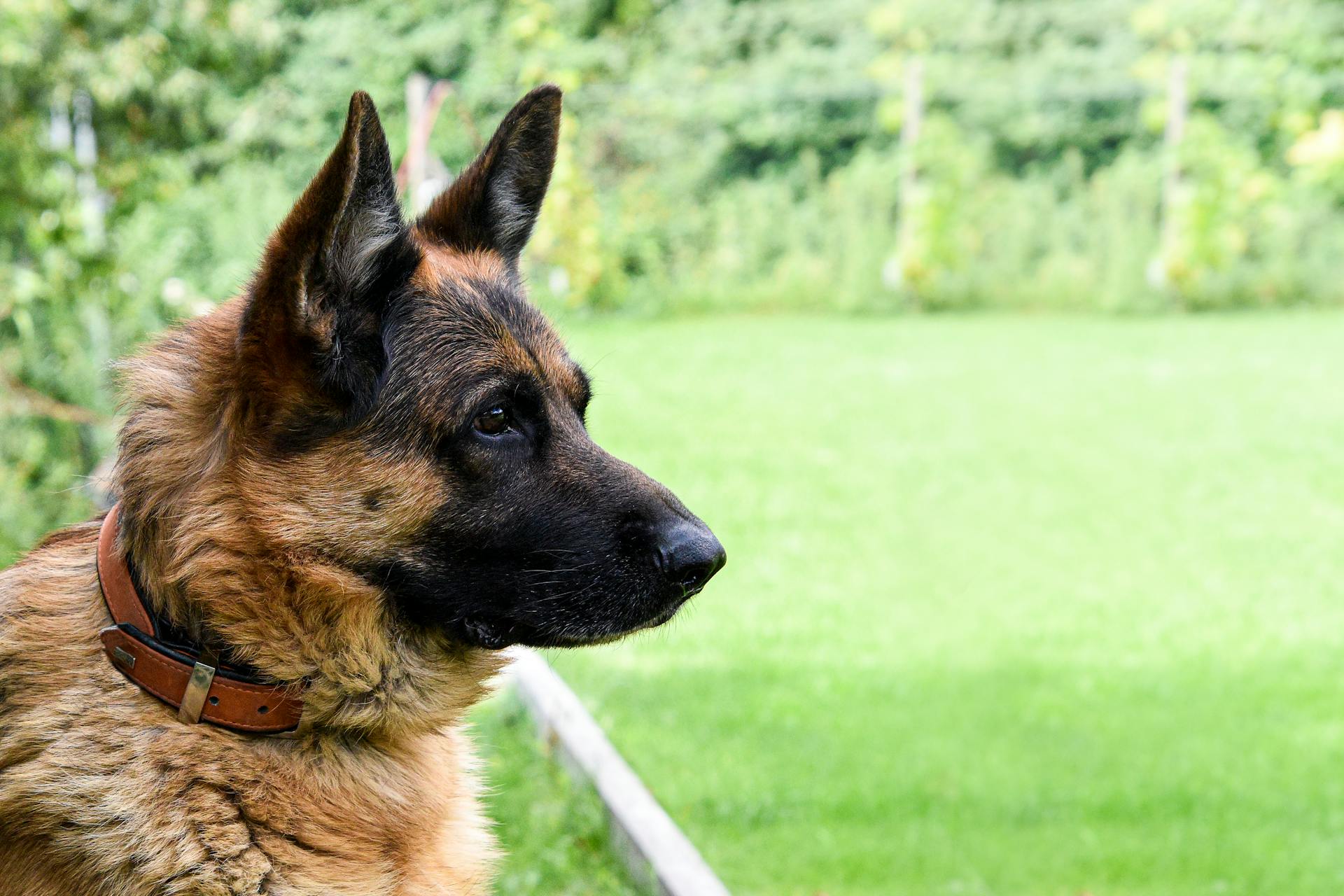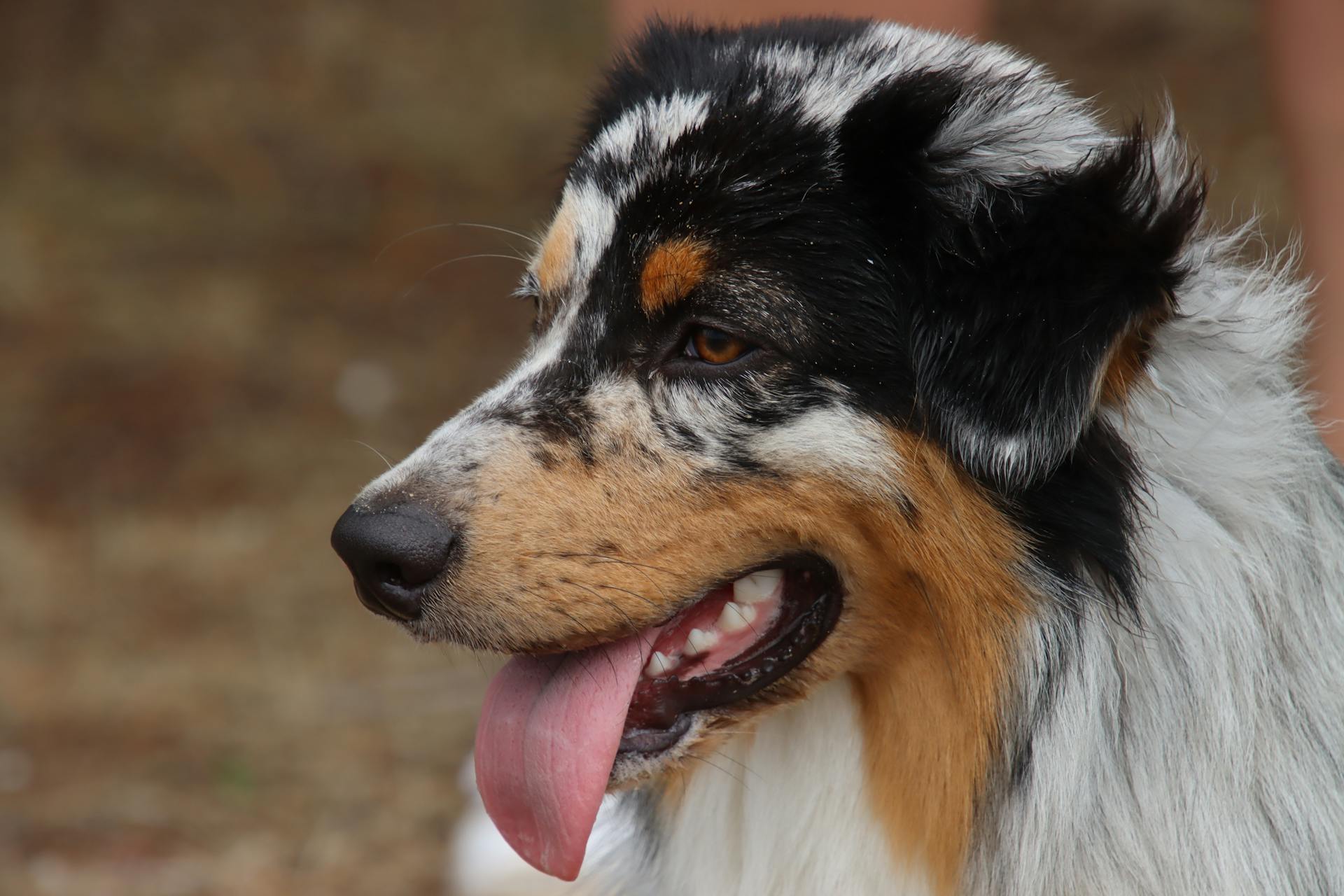
German Shepherds are often associated with wolves due to their physical resemblance and hunting prowess.
In reality, German Shepherds are a breed of domesticated dog that originated from herding dogs in Germany.
Their ancestors were likely a mix of various breeds, including the Thuringian Shepherd, the Wurttemberg Shepherd, and the Schwabian Shepherd.
These early breeds were bred to herd sheep and other livestock, not to hunt wolves.
Explore further: Different Types of German Shepherd Dogs
Breed History and Origins
The German Shepherd breed has a fascinating history. The breed was originally known as the "continental shepherd dog" in the 1800s, a group that included the Belgian Shepherd, German Shepherd, and Dutch Shepherd dog breeds.
Max von Stephanitz founded The Society for the German Shepherd Dog in 1899, which led to the breed being officially recognized. This was after he bred with a Thuringian cross show dog, which became the original sire of the GSD breed.
The Thuringian breed is notable for its wolf-like appearance, with traits such as erect ears, shaggy gray hair, and a curled tail. Much of the GSD's wolf-like appearance can be attributed to Thuringian genes.
Intriguing read: Breeding Mixed Breed Dogs
The Wurttemberg Sheep Dog was introduced into the GSD bloodline to temper the Thuringian's high energy and lack of focus. This breed added a sturdier body structure, denser bones, and higher stamina to the GSD.
The Swabian Service Dog contributed size, an even temper, and a courageous personality to the GSD. These traits are still characteristic of the breed today.
German Shepherds and wolves share many traits, including 78 chromosomes, which allows them to interbreed and have viable offspring. They also communicate similarly with whimpers, barks, and howls.
Selective breeding took German Shepherds down a different path from their wolf ancestors. However, they still retain some of their ancient traits, such as a keen prey drive and a low wanderlust potential.
Temperament and Behavior
They can start slowly in adolescence before becoming extremely apparent in adulthood, and their wolf-like tendencies may emerge as they grow up.
German Shepherd Wolf mixes are fiercely loyal and protective of their families yet wary of outsiders. They prefer to run and hide when trouble arises, so they're not the best watchdogs on the planet.
These dogs tend to be more pack-driven than other pups, which can lead to separation anxiety and a strong desire for company. They do best in families where they'll have plenty of interaction and may even benefit from having a canine companion.
Their intelligence makes them capable escape artists, so you'll need a large fence with plenty of fail-safes to prevent them from wandering off.
3 Facts About the Shepherd Mix
The German Shepherd breed has a fascinating history, and understanding its origins can be enlightening.
The German Shepherd breed is less than 100 years old, with the Verein Fur Deutsche Schaferhunde (SV) breed club formed on April 22, 1899 in Germany.
Interestingly, the original dogs bred to create the German Shepherd were a mix of various breeds, including Spitz, Collie, Wire-Coated Airedale, and Blue Merles.
The breed was developed for its working ability, specifically as a herding dog, not for its looks.
This diverse ancestry has resulted in German Shepherds coming in all colors and sizes.
It's worth noting that some German Shepherds have been known to exhibit wolf-like traits, such as shyness around strangers, which can be attributed to their wolf ancestry.
Behavior Often Doesn't Start Until Adolescence

As your German Shepherd Wolf Mix grows up, you may notice a change in their behavior. They often act like a regular puppy for the most part, but once they reach adolescence, their wolf-like tendencies can start to emerge. This can be a slow process that begins in adolescence before becoming more apparent in adulthood.
Their behavior can change suddenly, and it's essential to be aware of this shift. The wolf-like traits may not be present at all, depending on which parent's genes have a stronger influence.
It's not until they reach maturity that you may see the full extent of their wolf-like behavior. This can be a challenging time for owners, as they may struggle to manage their dog's new instincts.
Temperament & Intelligence
Your German Shepherd Wolf mix will likely be fiercely loyal and protective of their families yet wary of outsiders, preferring to run and hide when trouble arises.
They're smart animals, capable of picking up commands quickly, but not quite as eager to please as a regular German Shepherd would be.
These dogs are prone to separation anxiety due to their pack-driven nature, so they do best in families where they'll have plenty of company.
You may even want to consider giving them a canine companion, although this can have its own set of challenges.
Their intelligence makes them capable escape artists, so you'll need a large fence with plenty of fail-safes to prevent them from wandering off.
Training
Training a German Shepherd Wolf mix requires a firm hand, but not an abusive one. They respond best to positive reinforcement, such as treats or affection.
These dogs are powerful and can be unpredictable, so training isn't optional. You'll need to convince them to cooperate, rather than forcing them to obey.
Their natural intelligence allows them to pick up commands fairly quickly, but they're more independent than pure German Shepherds. This means they may not be particularly eager to please.
You'll need a professional trainer if you're not confident in your training abilities. Many trainers won't work with wolf hybrids due to the risks associated.
Training a wolf hybrid is not like training a regular dog, as you're dealing with wolf instincts that can come out at any time. You'll need to research and find a trainer with experience working with these animals.
Understanding a wolf hybrid's psychology and mindset is crucial. You need to know when they're pushing back against you and how to respond.
Taking a course to learn about wolves is a great idea. Your local zoo may also be able to provide valuable tips and advice.
You might enjoy: Black Wolf Dog Hybrid
Care and Ownership
Owning a German Shepherd Wolf mix is not for the faint of heart. It presents a unique set of challenges that require special care and attention.
You'll need to be prepared for the task of training, as it's a must for these dogs. Training a German Shepherd Wolf mix is not like training a regular purebred dog because you're dealing with wolf instincts that can come out at any time.
If you're new to training a wolf hybrid, it's a good idea to work with a trainer who has experience with these dogs. Ask for references and choose someone who uses positive reinforcement, rather than punishment.
Shepherd Mix Puppies
German Shepherd Wolf Mix puppies require a ton of training and socialization.
These dogs can be less predictable than those without wolf DNA, even if they're not inherently aggressive.
Wolf mixes are popular because they're different from regular dogs and because they're absolutely gorgeous animals.
However, owning one of these dogs can be a big responsibility, especially if you're not an experienced dog owner.
In some places, it's not even legal to own a German Shepherd Wolf Mix puppy, due to laws against owning wolf mixes.
You should do your homework before bringing one of these dogs home, to ensure you can provide the right care and attention.
9 Facts About Shepherd Mix
The German Shepherd Wolf mix is a majestic and commanding dog that has become one of the most well-known dog hybrids around.
They first appeared over a century ago, making them one of the oldest designer or hybrid dogs.
The German Shepherd and German Shepherd Wolf mix occurred within just a few years of each other, both owning their origins to the same man, Max von Stephanitz.
German Shepherds and wolves still share many traits, including 78 chromosomes, which allows them to interbreed and have viable offspring.
They also communicate similarly with whimpers, barks, and howls, suggesting that they can still understand each other despite their long evolutionary separation.
The German Shepherd has retained some of its ancient traits, including a keen prey drive, which is an asset for herding animals and livestock protection dogs.
However, German Shepherds have a low wanderlust potential, making sense since their purpose would require them to stay close to their charges.
Living with humans for 20,000–40,000 years has changed our pets, and today's dogs have a more diverse diet that includes foodstuffs wolves probably won't touch.
Pet Compatibility
Pet Compatibility can be a challenge with a German Shepherd Wolf mix. They're pack-oriented and may become depressed if left alone for long periods of time.
Socialization is key to helping your mix get along with other dogs. You'll want to introduce them to other pups as much as possible before bringing them home.
However, introducing a German Shepherd Wolf mix to cats and smaller animals is extremely risky. They may see them as food rather than friends.
If you do decide to have a mix and a cat, you'll need to keep a close eye on their behavior and be prepared for the worst. It's not worth taking the chance of your mix attacking your cat.
Keeping your mix on a secure leash and collar (or harness) during walks is crucial. If they get loose, they may attack other animals, including your neighbors' pets.
If this caught your attention, see: How Do You Say Cat in German?
Owning a Shepherd Mix
Owning a Shepherd Mix can be a rewarding experience, but it's not for the faint of heart. You'll need to be prepared for the unique challenges that come with raising a German Shepherd Wolf mix.
These dogs are not for first-time dog owners or even casual dog owners. They require a ton of training and socialization, and if you're not confident in your skills, you'll be playing with fire.
Recommended read: Are German Shepherds Good for First Time Owners
To ensure you're prepared, it's essential to do your homework before bringing one home. You should know that these dogs aren't legal in all jurisdictions, so be sure to check local laws before making a decision.
You'll need to closely watch for signs of the wolf side developing for the first two years, as they slowly pop up until they reach maturity. This is crucial, as it can affect their behavior and interactions with other animals.
Training a German Shepherd Wolf mix is not like training a regular purebred dog. You'll need to understand their wolf instincts and psychology to effectively train them. It's recommended to work with a trainer who has experience with these animals and uses positive reinforcement techniques.
With proper training and socialization, your German Shepherd Wolf mix can be a loyal and friendly companion. However, it's essential to remember that they can be incredibly destructive if left untrained or bored.
Frequently Asked Questions
What is the common ancestor of the German Shepherd?
The common ancestor of the German Shepherd is Horand, a dog that played a significant role in the breed's development. This ancestor is credited with helping shape the modern German Shepherd Dog.
What breed of dog has wolf in them?
The Saarloos wolfdog is a breed that combines German Shepherd and European wolf ancestry, known for its hardy and self-reliant nature. This unique breed was created through selective breeding in the 1930s.
How can I tell if my dog has wolf in it?
Genetic tests can reveal if your dog has wolf ancestry in its lineage, looking at 3-4 genetic markers to determine if wild wolf DNA has been present in the past three generations
Sources
Featured Images: pexels.com


